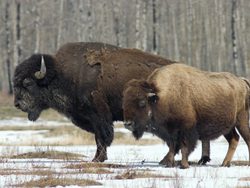
Elk Island National Park
Quick Navigation
Elk Island National Park is located just southeast of the central point in Alberta, Canada. The park covers an area of 75 square miles (194sq km).
The holds historical and cultural significance with over 200 separate archaeological locations that reveal tool-making remnants as well as campsites or some type of living.
The park is comprised of fescue grasslands, aspen parkland, and boreal forest that blanket a prairies plateau creating a habit that is rich and substantive for an array of wildlife. Of course, elk account for the largest population of ungulates in the park and serve as the namesake.
The wildlife is one of the key features of this biologically rich ecosystem. This prairie plateau is home to the largest population of hoofed mammals in all of Canada. These include bison, elk, moose, mule deer, and white-tailed deer. There is no denser population anywhere in the country.
Other large wildlife species roaming about the park boundaries include black bear, coyote, lynx, and timber wolf. Some of the smaller species include beaver, porcupine, and other typical prairie species.
There are over 250 species of birds that either nest or migrate through the park. The great blue herons and red-tailed hawks are two of the popular bird sightings. One of the unique facets of the park is that it is home to the largest terrestrial mammal in North America, the wood bison, while also being home to the smallest with the pygmy shrew.
Highlights
Without question, the abundance and array of wildlife in the national park is the highlight for most people. Most travelers venture into Elk Island for the purpose of seeing elk and many other species.
Ungulates
Elk Island has the densest population of hoofed animals across the entire country. Collectively, the relatively small national park is thriving with these magnificent creatures. The estimates for these include:

- Over 600 elk
- Approximately 300 moose
- Exceeding over 500 deer
- Over 300 wood bison
Elk Island has been tremendously successful in ungulate population growth. This success has been leveraged to export groups of different species to reintroduce and populate other regions of North America that had declined.
The herd of elk in the park represents the densest population of the varied ungulate species. Although the moose is the largest, some would argue that the elk is the most regal presenting of all the ungulates.
Elk Island National Park Trails
There are over a dozen trails providing aspects to the terrain and prairie plateau habit of the park. These trails provide hikers with a chance to see wildlife while hiking through the wilderness. The trails are mostly easy to moderate rated with a fair balance between the two.
Elk Island Highlights
- Wildlife
- Ungulates
Park Map
Sources
- All Trails, Best Trails in Elk Island National Park, https://www.alltrails.com/parks/canada/alberta/elk-island-national-park, retrieved July 2020.
- Britannica, Elk Island National Park, https://www.britannica.com/place/Elk-Island-National-Park, retrieved July 2020.
- Canadian Encyclopedia, Elk Island National Park, https://thecanadianencyclopedia.ca/en/article/elk-island-national-park, retrieved July 2020.
- National Geographic, National Parks of North America, Canada-United States-Mexico, National Geographic Society, 1995.
- Parks Canada, Elk Island National Park, https://www.pc.gc.ca/en/pn-np/ab/elkisland, retrieved July 2020.
- Travel Alberta, Elk Island National Park, https://www.travelalberta.com/ca/places-to-go/national-parks/elk-island-national-park/, retrieved July 2020.











